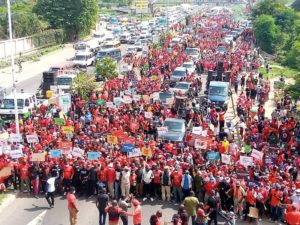The Supreme Court has rejected a request by the flagbearer of the National Democratic Congress (NDC), John Dramani Mahama, to order for a re-run of the 2020 polls.
According to the Justices of the apex court, John Mahama failed to convince them to make such an order.
The Supreme Court justices disclosed this in their judgment on the election petition case filed by John Mahama.
While reading the judgment of the apex court, Chief Justice, Kwasi Anin-Yeboah said: “The petitioner did not demonstrate in any way how the errors [committed by the EC] affected the declaration of the election…We have therefore no reason to order a re-run [of the polls]. We accordingly dismiss the petition”.
Background
John Mahama was challenging the results of the polls insisting that none of the nine presidential candidates obtained the mandatory 50%+1 vote constitutional threshold to be declared the winner of the polls.
In his petition filed on December 30, 2020, Mr. Mahama sought five reliefs from the apex court.
He among things asked the Supreme Court to declare the EC’s declaration of President Nana Akufo-Addo as winner of the polls as unconstitutional, null and void.
Mr. Mahama based his arguments on some declaration errors made by the EC as well as allegations of vote padding.
He also asked the apex court to order the Electoral Commission (EC) to conduct a re-run of the election between himself and President Akufo-Addo.
The petitioner called three witnesses to make his case at the court–Johnson Asiedu Nketiah, Dr. Michael Kpessa-Whyte and Rojo Mettle-Nunoo–and they were cross-examined.
Counter arguments
But the Respondents — the Electoral Commission and President Akufo-Addo– urged the apex court to dismiss the petition.
They argued that the petition was incompetent, lacked merit, and raised no reasonable cause of action.
Issues at stake
The Issues that were to be determined by the court were:
• Whether or not the petition discloses any reasonable cause of action.
• Whether or not based on the data contained in the declaration of the Electoral Commission of President Akufo-Addo as president-elect, no candidate obtained more than 50% of the valid votes cast as required by Article 63 (3) of the 1992 constitution.
• Whether or not the 2nd respondent still met the Article 63(3) of the 1992 constitution threshold by the exclusion or inclusion of the Techiman South constituency presidential election results.
• Whether or not the declaration by the first respondent dated 9th of December 2020 of the results of the presidential election conducted on the 7th of December 2020 was in violation of Article 63(3) of the 1992 constitution.
• Whether or not the alleged vote padding and other errors complained of by the petitioner affected the outcome of the presidential election results of 2020.
Ruling
In its ruling, the Supreme Court said the petitioner failed to prove his case via his petition or through his witnesses.
Chief Justice Anin-Yeboah who read the ruling said the accounts of Rojo Mettle-Nunoo and Dr. Michael Kpessa-Whyte were immaterial to the case since the issue in contention had nothing to do with how the results were collated at the Electoral Commission’s national collation centre popularly known as the Strongroom.
“Their testimonies were unworthy in the settlement of the issues,” Justice Anin-Yeboah said.
He said Mr. Mettle-Nunoo and Dr. Kpessa-Whyte should instead have themselves to blame for abandoning their post while the collation of the results was ongoing.
Reasonable cause of action – Anin-Yeboah said the court after critically examining the case so far was satisfied that the case discloses a cause of action and properly invoked the jurisdiction of the court.
He explained that the court need not focus on the strength of the case to determine whether or not the court has jurisdiction in the matter. The fact that a party’s case may be weak is no grounds for striking it out.
Crossing 50%+1 votes threshold ruling: There is no doubt that the EC chairperson announced 13,434,74 instead of 13,121,111 to be total valid votes cast. Calculations of the individual votes contained in the December 9 declaration of the petition to be 13,121,111. (This figure was admitted during the cross-examination of PW1, Johnson Asiedu Nketiah). There is no doubt that the petitioner accepts that the total valid votes cast was 13,121,111. No legal basis for anyone to contend that the 13,434,574 should be used as total valid votes.
The Supreme Court also stated that it was absolutely wrong to hold on to the error made by the EC against the commission as the error was subsequently corrected. Anin-Yeboah said Mahama’s legal team could not also provide any statute to the effect that the EC needed to consult stakeholders before effecting corrections.
Crossing 50%+1 vote threshold with or without Techiman South results ruling: Total valid votes with Techiman South inclusive will be 13,220,547. The computation will show that the second respondent made more than 50% plus one vote threshold. Even if all registered voters in Techiman South of 128,018 were added to the petitioner, the second respondent will still make the more than 50% threshold (50.79%).
On this issue, the court said it was established in court that President Nana Akufo-Addo crossed the 50%+1 vote requirement even without the results from Techiman South constituency prior to the declaration of the presidential results on December 9, 2020.
Declaration vs violation of Article 63 (3) of the 1992 Constitution: Judgement – The error committed by the commissioner cannot void the declaration. Agreeing to the petitioner’s case will mean errors by the commission in a post will nullify the truth of the statement even if that is not the case. The Commission did not act in violation of Article 63(3) of the 1992 Constitution. The petitioner has not been able to prove that none of the candidates got more than 50% of the total votes cast.
Whether alleged vote padding and errors affected the outcome of results: Judgment – We find the allegations of vote padding very serious. We have observed already that this allegation was not proven by the petitioner. Evidence proves that even if the vote padding occurred, it would have been insignificant to overturn the election result. The Petitioner did not adduce cogent evidence to back this claim. The court expected the pink sheets to be exhibited to prove the claims. Allegations of wrong aggregations of votes were not proved. Even if the vote padding was accepted, it will not impact the validity of the votes of Nana Akufo-Addo.
“We conclude this judgment by emphasizing that the petitioner did not demonstrate in any way how the alleged errors and the unilateral corrections by the 1st respondent affected the validity of the declaration made by the Chairperson of the 1st respondent made on the 9th December 2020 as already stated in this judgment. The petitioner has not produced any evidence to rebut the presumption created by the publication of CI 135…We, therefore, have no reason to order a re-run as sort by the petitioner. So we accordingly dismiss the petition,” Mr. Anin-Yeboah concluded.






